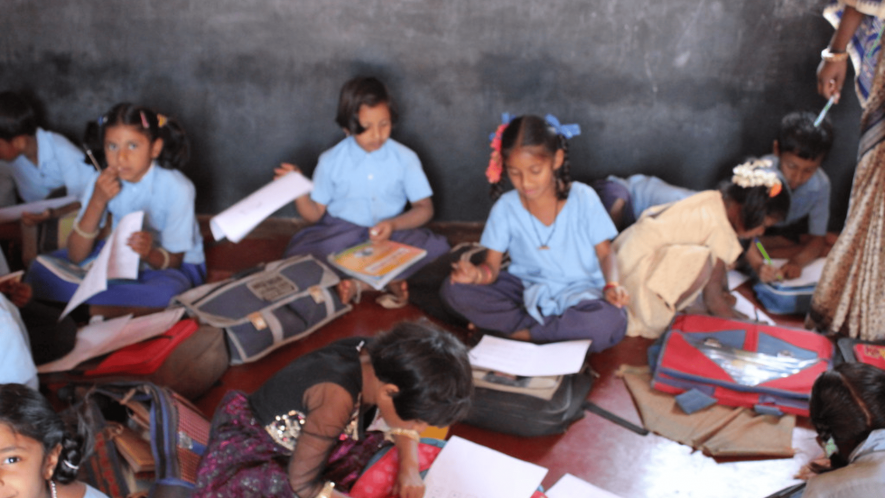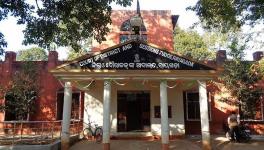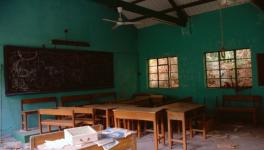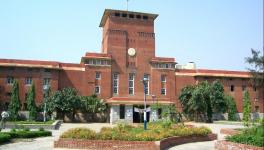Adivasi Students in AP Struggle in Mother Tongue-Based Education Initiative

Representational Image. Image Courtesy: Flickr
Two weeks ago, on the third anniversary of the New Education Policy (NEP) 2020, Prime Minister Narendra Modi announced that one of his government's commitments is to enhance Mother Tongue-based -Multilingual Education (MTB-MLE) to address the structural gaps in infrastructure and opportunities that majority of the country’s students face. Seeking to improve the learning experience and relevance of education for students marginalised by caste, tribal status, first-generation status, class, and region, this social justice commitment seeks to provide equal opportunities for non-English learners, who are often stigmatised.
Due to the oppressor castes' monopolisation of elite English language education, fighting this stigma becomes part of the marginalised students’ fight against historical academic gatekeeping in India. Beyond PM Modi’s focus on bridging the gap between English and non-English learners, the authors aim to recentre the significance this initiative holds for tribal students, who often face challenges, such as language barriers, when they enrol in primary school in their villages.
The medium of instruction is usually the dominant official language of their respective states, such as Odia in Odisha, Telugu in Telangana, Andhra Pradesh, Kannada in Karnataka, Bengali in West Bengal or Hindi in North Indian states, and not the Indigenous languages they grow up with at home.
This dissonance at such a young age and difficulty in establishing relevance lead to a lack of interest in attending school, not being able to meet learning objectives, class repetition, and eventual dropouts, leading to the structural invisibility of Adivasi students and their scintillating knowledge systems in the mainstream. Therefore, providing Adivasi students with education in their mother tongues is an essential first step in bridging this gap and transitioning from their Adivasi languages to the dominant language as a medium of instruction.
However, a closer examination of the government's efforts under the NEP over the past three years reveals a lack of substantial measures to implement MTB-MLE, especially for Scheduled Tribal (ST) students, effectively. This inefficiency is concerning, as education in their mother tongues is crucial for their meaningful participation and engagement in learning. The absence of notable progress raises valid questions about the government's commitment to fulfilling its promises.
In this regard, the authors look specifically at the Andhra Pradesh (AP) government's MTB-MLE programme, which was initiated in 2003 with Go.no. 7741/D.P.E.P/B9/TE/2003, and began implementation in the academic year 2004-2005 with eight Adivasi languages, including Adivasi Oriya, Gondi, Koya, Kolami, Konda, Kuvi, Lambadi, and Savara from Andhra and the current Telangana state.
The united Andhra Pradesh state was the first to implement the MTB-MLE programme in the country, followed by Odisha. Although the MTB-MLE initiative is a progressive policy aimed at supporting Adivasi students, a closer look at the implementation process reveals the bureaucratic and political challenges that Adivasi-native language volunteers and Adivasi primary school students face.
According to a letter from the AP Tribal Welfare Department on July 7, 2023, 1454 schools are implementing the MTB-MLE program in seven tribal languages across 11 districts. While the state government's initiative appears to be implemented smoothly, the MTB-MLE facilitators, known as MTB-MLE native speakers or Mathru Basha Volunteers in Telugu, have encountered several challenges.
These MTB-MLE volunteers, from various Adivasi (Indigenous) communities across the state, are hired from the same village or Gram Panchayat and hold at least a Secondary School Certificate (on passing class 10). Their role is crucial in assisting Adivasi students from classes 1 to 3, helping them to get comfortable with Telugu and English. These native volunteers play a vital role in laying the foundation for students' early development and investment in education.
Despite their importance, the support provided to Adivasi volunteers by the state is remarkably inadequate. For instance, while their working hours are equivalent to or longer than those of regular teachers, they receive a mere salary of Rs. 40 per hour. There's a strict rule capping their monthly salary at Rs. 5,000. This rule appears to be nothing short of cruelty towards the Adivasi volunteers, especially considering that regular government teachers in Andhra Pradesh receive among the highest salaries in the country.
Further, the Adivasi MTB-MLE teachers received their salaries for the January, February, and March months of the 2022-23 academic year in May, while payments for April and June were made in mid-July. Interestingly, the Department of Tribal Welfare, AP Samagra Shiksha office, does not classify these payments as salaries in the official documents; instead, they label them honorariums. This classification potentially exposes the MTB volunteers, who lack job security, Provident Fund, and insurance facilities, to exploitation.
Furthermore, these Adivasi MTB-MLE teachers aren't paid for the month of May due to school closures. While regular teachers in government schools receive their salaries throughout the year, these government-employed volunteers experience the opposite. Even teachers in private schools are paid their salaries in May, but these volunteers go unpaid, highlighting how susceptible they are to exploitation by the government.
This discrepancy reveals the unfortunate extent to which Adivasi volunteers can be taken advantage of, apart from the everyday discrimination they face from their non-Adivasi peers, who do not favour their student-teacher interactions in their Indigenous mother tongue.
Although the government boasts its commitment to educating Adivasi students in their native languages during rallies and policy papers, the reality at the grassroots level tells a different story—a complete failure. This disappointment extends to the New Education Policy 2020, which surprisingly does not address the recruitment, salaries, or support systems for MTB-MLE Adivasi volunteers.
These poorly designed policies leave dedicated volunteers with inadequate pay and insufficient training. This negligence suggests that the state does not prioritise the well-being of the Adivasi students, volunteers, and communities.
Authors:
Parvathy Pangi works as an Independent Community Researcher in Paderu, Andhra Pradesh.
Ramesh Korra works as an Independent Community Researcher in Paderu, Andhra Pradesh.
Ashok Danavath works with the National Campaign on Dalit Human Rights as Senior Researcher.
Vidya is a law student anticipated to be admitted to practice in Texas in 2025.
Radhika Marwaha is a graduate student at UC San Diego’s Ethnic Studies Program.
(This article is being published as part of an ongoing collaborative community-based research with Kondh Adivasi community Research Associates from Paderu District of Andhra Pradesh. Views expressed are personal.)
Get the latest reports & analysis with people's perspective on Protests, movements & deep analytical videos, discussions of the current affairs in your Telegram app. Subscribe to NewsClick's Telegram channel & get Real-Time updates on stories, as they get published on our website.
























